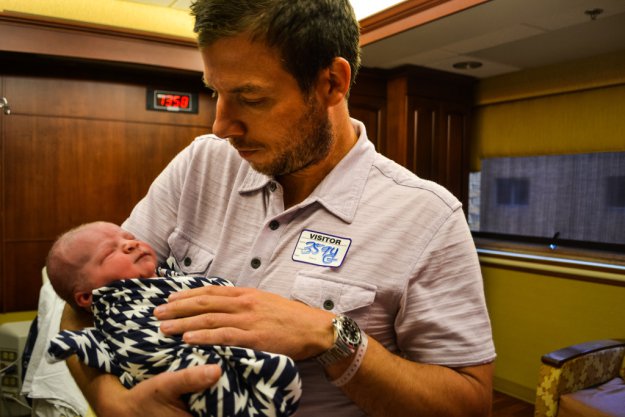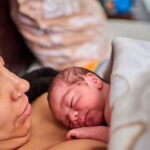The life within: Your baby's amazing journey

Suddenly pregnancy doesn’t seem so very long at all! As […]

A baby’s formation is nothing short of a miracle. Boy meets girl, sperm meets egg, and before you can snap your fingers, you’re calculating a due date and popping out of your jeans. As your body adjusts and swells, incredible transformations are taking place inside. Your baby’s abilities are expanding month by month as he gets ready to make his world debut. Knowing what’s going on in there can help you enjoy the process a bit more, tolerate your discomfort a little better, and further bond with the new life you’re creating. So track your baby’s progress and prepare to be awed.
Month one
There’s not much to see yet (at least with the naked eye), but if you could put your proliferating mass-of-cells-that-will-someday-be-a-baby under a microscope, you would be amazed to discover the changes taking place. From day one, the zygote (formed when sperm and egg unite) undergoes rapid cell division and multiplication; the resulting blastocyst travels to the uterus, which is quickly becoming the ideal environment for baby incubation.
A week after conception, the embryo is merely a freckle-sized collection of cells, but these cells are already becoming diversified, marked for use in the gestational sac, placenta or baby’s body. And though you won’t recognize Uncle Jordan’s profile or Grandma Jenny’s ears for many months to come, baby’s gender and numerous characteristics have already been decided by mom and dad’s chromosome transfer.
Month two
Your baby begins his second month looking more like a tadpole than a person (tail and all!), but he’s well on his way to becoming the thriving, lovable infant he’ll someday be.
Many major organs are forming this month: The heart splits into two chambers, the brain divides into dual hemispheres, and the pancreas, intestines, lungs and appendix are coming along. Baby’s skeletal development is well under way. Budding arms and legs have sprouted from the torso; your little one has begun to exercise these limbs, though you won’t feel any movement just yet. Eyes (complete with preliminary lids), nose and ears are developing. By the end of month two, your baby is about 11/2 inches long from head to rump and about .18 ounces in weight. If you have an eight-week ultrasound (when baby is 6 weeks old), you’ll be able to peek at your little wonder, who may (for the moment) claim a close resemblance to a gummi bear: large head, stubby limbs, round torso.
Month three
Your baby has fingernails! (Remember that scene in Juno?) There are lots of other changes this month too: Fingers and toes separate, hair begins to appear, and the neck gradually lengthens. Your baby has begun to produce hormones, and his digestive and nervous systems are further developed. By now, baby’s bones and organs are in place; for the duration of your pregnancy, baby’s body will mostly develop and build upon existing structures.
At your 12-week doctor’s visit (when baby is 10 weeks developed), you may be able to hear a heartbeat, which will sound very rapid compared to your own. This is a special chance to feel a connection with your little one. Be prepared with tissues (those crazy hormones love to turn on the tears), and consider bringing family members along to share the experience.
Month four
Baby is about the size of a grapefruit, though he weighs less than 2 ounces at the beginning of month four. His face is looking much more “human,” with eyes and ears close to the locations they’ll occupy at birth. Baby’s body begins to catch up in proportion to his head as your pregnancy progresses. Lanugo, a fine, soft type of hair, covers his body; some of this hair may still be apparent at birth, but it will fall out soon after.
You may begin to feel your baby move during the fourth month of his development, although you might not recognize the sensation if this is your first pregnancy. Baby will likely be most active when you’re lying down at night—as your body motion isn’t lulling him to sleep—and you may also be able to feel his movements better after eating a meal.
Month five
During the fifth month, baby grows from 7 ounces to over 12 ounces; he’ll continue to grow steadily as he adds much-needed fat to his lean frame. Baby’s skin is maturing, and he has begun secreting vernix, a white goo that will protect his skin from the amniotic fluid until birth. Speaking of amniotic fluid, your baby may begin to swallow some as his digestive system advances this month. (Don’t worry. As gross as it sounds, it won’t hurt him!)
You may have an ultrasound around week 20 of your pregnancy, when your baby-to-be is 18 weeks old. Your baby’s gender will likely be evident at this time (although ultrasound techs do make mistakes every once in a while). You’ll also be able to check out baby’s organs, bones, even his little hands and feet. Get ready to fall in love—there’s really a baby in there!
Month six
Baby finally surpasses the 1-pound mark this month. He will startle now in reaction to loud noises, so it’s important to be aware of your environment and how it could affect your little one. The din of the womb—the swoosh of amniotic fluid and the sound of your beating heart and flowing blood—smothers and distorts many noises, but baby will learn the sound and reverberations of your voice and the voices of those who are around you often. Sing or read to your baby; an oft-repeated book can offer special comfort after his birth. Because you don’t want to interrupt baby’s sleep pattern, refrain from making loud noises near the belly, poking forcefully, or shining a flashlight at your bump.
Month seven
Baby’s five senses are fully developed—he’s testing them out in his cloistered abode. In addition to tasting amniotic fluid and listening to your voice, he now opens and closes his eyes, recognizing changes in light. Your little buddy grows from about 2 to 3 pounds during his seventh month, and from 15.5 to 17 inches, head to toe. This month, the amount of brain tissue increases, and baby’s eyelashes, eyebrows and head hair may appear.
Although your baby is only the size of your forearm, advances in modern medicine have made it possible for an infant delivered at this time to survive. However, your baby’s brain and lungs still have major developing to do, and he needs to gain several pounds before birth, so don’t rush your delivery date! Do your best to prevent premature delivery—and the risks it incurs—by following your doctor’s recommendations and trying to keep your stress level as low as possible.
Month eight
The brain, which was previously smooth, is now extensively folded; the “thinking” parts have grown in preparation for future responsibilities (the periodic table, the SAT, sitcom theme songs). Your baby begins dreaming at the beginning of the month. He also learns to open his eyes while awake and close them while asleep.
Grow your bond by introducing your baby to your favorite tunes. By this time, he might even show a preference for a certain genre. Remember not to blast anything right at him—his sleep cycle can’t handle it—and choose tunes with comforting melodies. Try classical, country, R&B, pop, even soft rock —pick music that will lift your mood while it entertains your little one. Baby doesn’t have the freedom of movement he once enjoyed (it’s a tight fit in the uterus these days!), but if he’s feeling it, he’ll find space to move with the music.
Month nine
This is the home stretch … literally! At the beginning of his final month, baby is already over 5 pounds; the average baby weighs between 7 and 71/2 pounds at birth. Your baby is likely now positioned with his head downward and will drop into the birth canal early this month. Baby has probably become rather plump, compared with earlier months; he fills up the uterus and experiences restricted movement because of it.
The last organs to fully develop are the lungs, which are preparing to allow baby to breathe on his own. In fact, baby’s entire body is getting ready to become independent the moment he leaves your womb and enters the world. Moments after birth, he will begin exercising his lungs and vocal chords. He will immediately look for food with his mouth rather than taking nourishment through the umbilical cord, and he will no longer depend on the placenta. But rest assured, he’ll need you just as much as ever! Here comes your child, your sidekick, your friend—and your journey together is just beginning.







